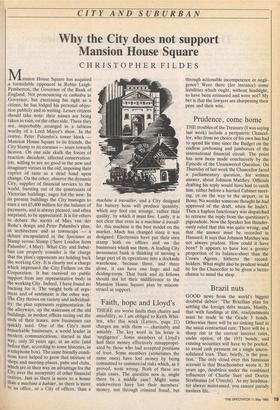CITY AND SUBURBAN
Why the City does not support Mansion House Square
CHRISTOPHER FILDES
Mansion House Square has acquired ,a formidable opponent in Robin Leigh- Pemberton, the Governor of the Bank of England. Not pronouncing ex cathedra as Governor, but exercising his right as a citizen, he has lodged his personal objec- tion publicly and in writing. Lesser citizens should take note: their names are being taken in vain, on the other side. There they are, improbably arranged in a tableau worthy of a Lord Mayor's show. In the centre, Peter Palumbo's tower block — Mansion House Square to its friends, the City Stump to its enemies — soars towards heaven. On one side skulk the forces of reaction: decadent, affected conservation- ists, willing to see no good in the new and imaginary virtues in the old, imposing their caprice of taste as a dead hand upon change. On the other, observe the dynamic City, supplier of financial services to the world, bursting out of the constraints of Victorian buildings, eager for the new. In its present buildings the City manages to earn a net £5,400 million for the balance of payments, and is always pleased, and often surprised, to be appreciated. It is for others to debate the merits of Mies van der Rohe's design and Peter Palumbo's plan, as architecture and as townscape — a debate encapsulated in the Spectator as Stamp versus Stump ('Save London from Palumbo', 4 May). What City and Subur- ban can properly consider is the charge that the plan's opponents are holding back the working City. It is clearly not a charge which impressed the City Fathers on the Corporation. It has received no public support from any representative body in the working City. Indeed, I have found no backing for it. The weight both of argu- ment and of sentiment is the other way. The City thrives on variety and individual- ity: the plan represents regimentation. In the alleyways, up the staircases of the old buildings, in modest offices seeing out the ends of their leases, new businesses can quickly seed. One of the City's most remarkable businesses, a world leader in modern communications, started in that way, only 20 years ago, in an attic (and before that, according to some histories, in a telephone box). The same friendly condi- tions have helped to grow that mixture of Shops and meeting-places, pubs and clubs, Which are in their way an advantage for the City over the anonymity of other financial centres. Just as there is more to a house than a machine d habiter, so there is more to an office, or a City of offices, than a machine .1 travailler, and a City designed for battery hens will produce quantity, which any fool can arrange, rather than quality, by which it must live. Lastly, it is not clear that even as a machine d travail- ler, this machine is the best model on the market. Much has changed since it was designed. Electronics have put their own stamp both on offices and on the businesses which use them. A leading City investment bank is thinking of moving a large part of its operations into a dockside warehouse, because there, and there alone, it can have one huge and tall dealing-room. That bank and its fellows should not let their indifference to the Mansion House Square plan be miscon- strued as support.














































 Previous page
Previous page